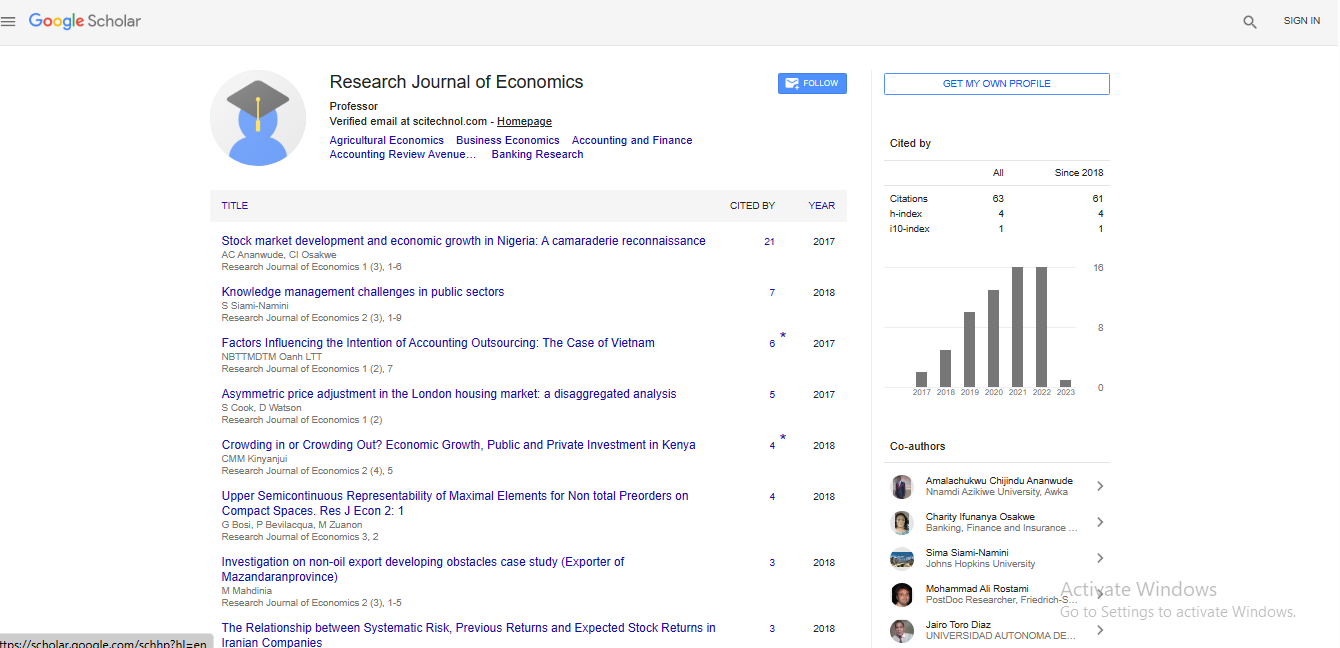Perspective, Res J Econ Vol: 7 Issue: 2
Exploring the Role of Public Economics and its significance
Hong Matthew*
1Department of Economics and Management, China University of Geosciences, Beijing, China
*Corresponding Author: Hong Matthew
Department of Economics and
Management, China University of Geosciences, Beijing, China
E-mail: hongmatthew@cug31.cn
Received date: 20 February, 2023, Manuscript No. RJE-23-97092;
Editor assigned date: 22 February, 2023, PreQC No. RJE-23-97092 (PQ);
Reviewed date: 09 March, 2023, QC No. RJE-23-97092;
Revised date: 16 March, 2023, Manuscript No. RJE-23-97092 (R);
Published date: 23 March, 2023, DOI: 10.4172/RJE.1000140
Citation: Matthew H (2023) Exploring the Role of Public Economics and it’s Significance. Res J Econ 7:2.
Description
Public economics is a field of economics that deals with the study of government policies and their impact on economic behavior and outcomes. It involves the analysis of the effects of government spending, taxation, and other forms of public intervention on market outcomes, social welfare, and economic efficiency. It is a wide field with numerous applications, and it has been a focus of studies for many decades. Public economics is based on several theoretical frameworks that have been developed over the years. The most commonly used framework is the theory of market failure, which suggests that markets may fail to allocate resources efficiently due to externalities, public goods, imperfect information, and other factors. Public economics also draws on the principles of welfare economics, which provide a normative framework for evaluating the economic impact of public policies. In addition, public economics is influenced by game theory, which studies strategic interactions between individuals or groups, and by behavioral economics, which examines how human behavior deviates from the assumptions of standard economic models. Public economics employs a variety of methods to analyze the effects of public policies on economic behavior and outcomes. These methods include theoretical models, empirical analysis, experimental studies, and simulation techniques. Theoretical models are used to develop and test hypotheses about the impact of government policies on economic outcomes. Empirical analysis involves the use of statistical methods to estimate the effects of public policies on real-world data. Experimental studies involve the use of controlled experiments to study the impact of public policies on economic behavior. Simulation techniques involve the use of computer models to simulate the effects of public policies on economic outcomes.
Applications of public economics
Public economics has many applications in the real world. One of the most important applications is in the design and evaluation of public policies. Public economics can help policymakers identify the most effective and efficient ways to achieve their policy objectives. For example, public economics can help policymakers determine the optimal level of taxation to raise revenue for public goods and services. It can also help policymakers design welfare programs that minimize adverse incentives and promote social welfare. One of the most important applications of public economics is in the field of taxation. Taxation is an essential tool used by governments to raise revenue to fund public goods and services such as healthcare, education, and infrastructure. Another application of public economics is in the analysis of market failures. Public economics can help identify situations where markets fail to allocate resources efficiently and suggest ways to correct these failures. For example, public economics can help policymakers design environmental policies that address externalities and promote sustainable economic growth. Public goods or services that are non-excludable and non-rivalrous. This means that once they are provided, everyone can enjoy them, and their consumption by one person does not reduce their availability to others. Public economists analyze the provision of public goods by governments and the optimal levels of provision. They also examine the mechanisms used to finance public goods, such as taxes, user fees, and public-private partnerships.
Conclusion
Public economics is a vital field that plays an important role in the design and evaluation of public policies. Its theoretical frameworks, methods, and applications provide policymakers with valuable insights into the impact of government policies on economic behavior and outcomes. Public economics has many challenges and opportunities, and it will continue to evolve and grow in importance as governments around the world face new and complex economic challenges.
 Spanish
Spanish  Chinese
Chinese  Russian
Russian  German
German  French
French  Japanese
Japanese  Portuguese
Portuguese  Hindi
Hindi 